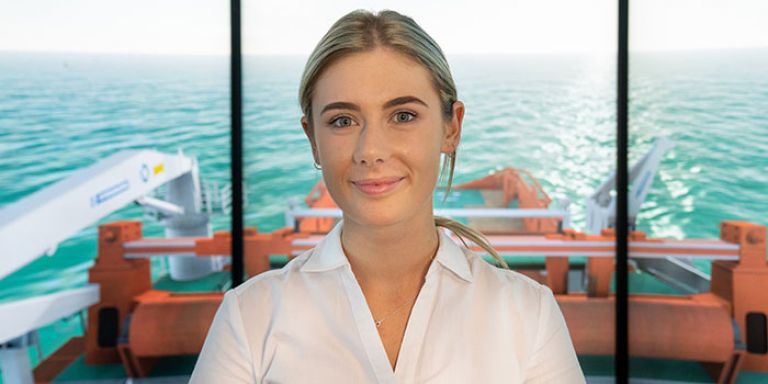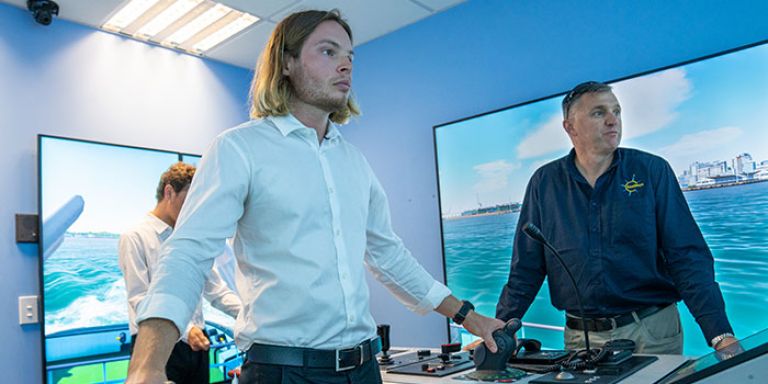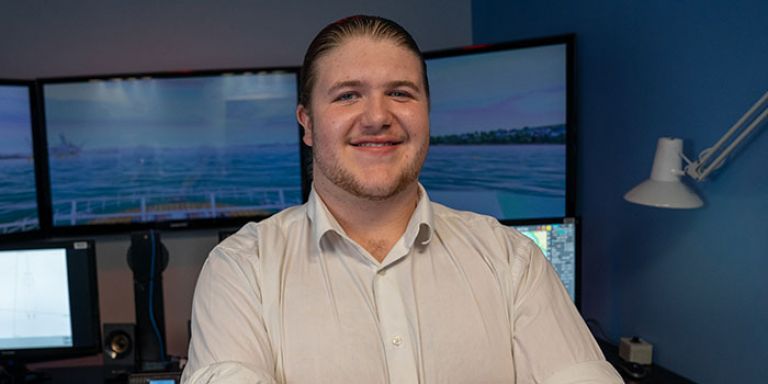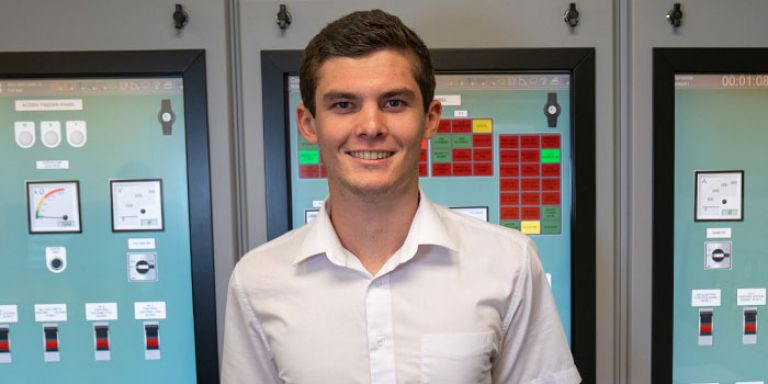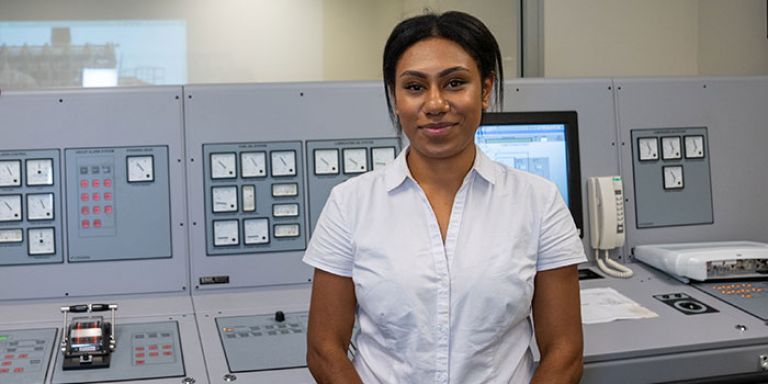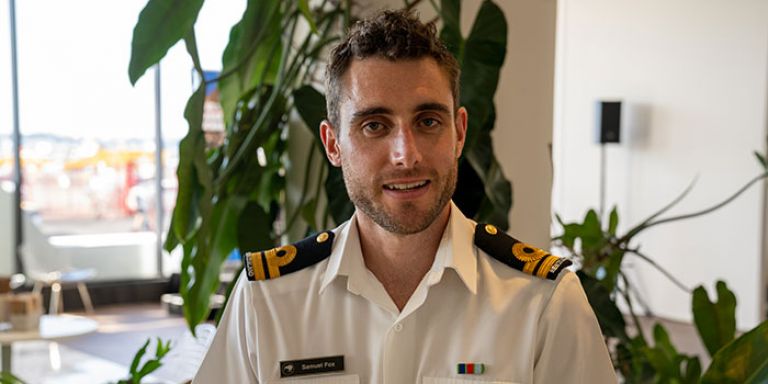Programme highlights
Develop your skills to become a watchkeeper (officer of the watch) on seagoing ships.
This programme is for you if:
- You are a new trainee entering the industry and need to complete your training before you commence your job at sea. You will need to complete the 17 week New Zealand Certificate in Maritime Crewing (Level 4) Deck Crew strand before progressing into this programme; or
- You are in the industry, training to become a watchkeeper on ships of 500 gross tonnage or more, operating in unlimited waters.
This programme can be completed full-time, or in short blocks in between periods at sea.
Learn the skills and knowledge to complete all the duties required of a watchkeeper deck (officer in charge of a navigational watch) onboard seagoing ships. You’ll work directly under the Chief Mate or Master and have a very high level of responsibility for the safety of the vessel.
You will learn to manage the planning of a passage and the maintenance of a safe navigational watch using electronic navigation aids and traditional celestial navigation on a seagoing vessel. You will learn how to manage the cargo and the non-technical maintenance of the vessel at an operational level. You will also learn advanced leadership skills to manage resources and crew onboard, and lead the response to emergencies and distress at sea.
Recognition of Prior Learning
If you have been advised that you will receive a Recognition of Prior Knowledge and Skills (RPKS) towards your sea time, this will incur a fee of $36 per credit. For more information please visit our Recognition of Prior Learning page.
This qualification leads to a Maritime New Zealand (MNZ) certificate. Expand for more detail.
You need to complete this qualification including sea time, before applying to MNZ for a:
There are two options for sea time requirements:
- Option one: 12 months sea time and your MNZ approved Training Record Book (TRB); or
- Option two (already in industry): At least 36 months experience working on a qualifying ship, including at least 6 months as part of the navigation team. For more information on this study option, please contact NZ Maritime School.
Award of the MNZ certificate of competency will also require the completion of:
- Sea service
- MNZ medical fitness certificate
- Eyesight test (including for colour vision)
- Fit and proper person check
- Final exam
- Ancillary certificates.
See maritimenz.govt.nz for all requirements needed before you apply.
Holders of this certificate of competency will have the licence required to work as a watchkeeper deck (officer in charge of a navigational watch) on ships of any gross tonnage under the MNZ SeaCert licencing system. This is an internationally recognised programme, meeting the standards of the IMO (International Maritime Organisation) STCW code (Standard for Training and Certification for Watchkeepers), (regulation II/2).
Entry requirements
General
- Students intending to pursue a seagoing career must produce evidence of having met the medical and eyesight standards currently in force by Maritime New Zealand. These are statutory requirements for working on ships.
AND
- Completed the academic component of the New Zealand Certificate in Maritime Crewing – Able Seafarer Deck strand (L4) (NZ2511-01)
OR
- Provide evidence of sea service required for the Watchkeeper certificate of competency as per STCW code
Academic
Applicants must meet the following criteria for admission into the programme
Applicants with no seagoing experience:
- 14 credits in either Mathematics (calculus, algebra or equivalent) and/or Physics
English Language entry requirements
Applicants must have sufficient competence in the English language to undertake this programme which is taught and assessed in English.
International students: English Language Entry Requirements
For the minimum English language requirements refer to the requirements set out in the NZQF Programme and Accreditation Rules.
Note: For this programme this means applicants whose first language is not English may be required to provide evidence of IELTS (Academic) band score of 6.0 or no band lower than 5.5.
Special & discretionary admission
Any ākonga who is 20 years of age or older and has not reached the general admission requirements for their intended programme is eligible for Special Admission. MIT works with the ākonga to ensure they are prepared for their intended programme. Any ākonga who is not yet 20 years of age and has not reached the general admission requirements for their intended programme may be eligible for Discretionary Admission. In assessing whether to grant Discretionary Admission, the delegated authority focuses on the applicant’s level of preparedness for their intended programme.
Give yourself credit with Recognition of Prior Learning (RPL)
Did you know you can use the knowledge and experience you already have to your advantage?
Your previous work experience and on-the-job skills, volunteering, professional development, and other providers’ qualifications can be recognised as prior learning, matched against credits in our courses, and put towards your qualification – potentially saving you money and possibly helping you to complete your qualification faster Learn more.
Programme structure
You will need to complete the below 26 courses (300 credits):
Year one
Level 2
942.204 Maritime Preparatory (7 credits)
Introduction to solving problems using applied mathematics and the principles of physics in the maritime environment.
Level 3
141.318 Maritime Mathematics (15 credits)
Solve problems using applied mathematics in the maritime environment.
942.306 Maritime Computing (7 credits)
Introduction to computers in the maritime environment.
Level 4
942.418 Bridge Preparatory (10 credits)
Preparatory for students about to complete their 6 months understudying the officer of the watch at sea.
942.419 Basic Fire Fighting (6 credits)
Control and extinguish fires on board ship and conduct blind search and rescue operations.
942.430 Proficiency in Survival Craft (6 credits)
Take charge of survival craft.
942.431 Maritime Industry (7 credits)
Demonstrate knowledge of the maritime industry.
942.445 Maritime Physics (19 credits)
Apply physics principles to appreciate systems and to solve problems in the maritime environment.
Year two
Onsite component – Level 4
942.446 Ship Construction (7 credits)
Demonstrate knowledge of ship construction.
Onsite component -Level 5
942.507 Coastal Navigation (14 credits)
Navigate a foreign-going ship using coastal navigation techniques.
942.514 Deck Watchkeeping (8 credits)
Perform the duties of a deck watchkeeper in port and dry dock.
942.521 Plan Passages (4 credits)
Plan passages for foreign-going ships.
942.522 Anti-Collision Radar (8 credits)
Utilise radar on foreign-going ships for collision prevention.
942.523 Tidal Predictions (4 credits)
Determine tidal windows for port entry and departure.
942.524 Meteorology (12 credits)
Apply the principles of meteorology to forecast future conditions.
942.526 Compass Work (4 credits)
Utilise compasses, repeaters and automatic pilots of foreign-going ships.
946.501 Celestial Navigation (10 credits)
Navigate a foreign-going ship using celestial techniques.
942.510 Basic training for Oil and Chemical Tanker cargo operations (6 credits) (optional course)
This course provides students with the knowledge, understanding and proficiency to serve on oil and chemical tankers and be assigned specific duties and responsibilities related to cargo or cargo equipment.
Onsite component – Level 6
942.662 Stability and Stress (15 credits)
Demonstrate knowledge of ship construction.
942.664 Cargo Work (15 credits)
Determine criteria for the handling and carriage of cargoes in a foreign-going ship.
942.666 Electronic Navigation (15 credits)
Navigate a foreign-going ship using electronic aids.
942.668 Bridge Watchkeeping (16 credits)
Perform the duties of a watchkeeping officer.
Practicum/at sea component – Level 4
942.444 Ship Construction (4 credits)
Demonstrate knowledge of ship construction.
Practicum/at sea component – Level 5
942.529 Meteorology (4 credits)
Apply the principles of meteorology to forecast future conditions.
942.556 Plan Passages (3 credits)
Plan passages for foreign-going ships.
942.557 Anti-Collision Radar (4 credits)
Utilise radar on foreign-going ships for collision prevention.
942.559 Tidal Predictions (3 credits)
Determine tidal windows for port entry and departure.
942.564 Coastal Navigation (4 credits)
Navigate a foreign-going ship using celestial techniques.
942.565 Deck Watchkeeping (7 credits)
Perform the duties of a deck watchkeeper in port and dry dock.
942.567 Compass Work (4 credits)
Utilise compasses, repeaters and automatic pilots of foreign-going ships.
946.502 Celestial Navigation (4 credits)
Navigate a foreign-going ship using celestial techniques.
Practicum/at sea Component – Level 6
942.663 Stability and Stress (4 credits)
Demonstrate knowledge of ship construction.
942.665 Cargo Work (4 credits)
Determine criteria for the handling and carriage of cargoes in a foreign-going ship.
942.667 Electronic Navigation (5 credits)
Navigate a foreign-going ship using electronic aids.
942.669 Bridge Watchkeeping (5 credits)
Perform the duties of a watchkeeping officer.
Year three
Level 4
942.492 Maritime Restricted Operators Certificate (MROC) (2 credits)
Conduct external communications using maritime radio telephone subsystems.
Level 5
942.599 First Aid at Sea (FAAS) (5 credits)
To enable appropriate medical response to be offered where professional care may be at least a week away.
942.525 GMDSS (6 credits)
Conduct external communications using GMDSS subsystems.
946.503 MSA Safety Oral (17 credits)
This course is to prepare students to take the MNZ oral examination for Watchkeeper or Second Mate of a Foreign Going Ship.
Level 6
942.614 Advanced Fire Fighting (6 credits)
Take charge of fire-fighting and damage control activity.
Do you want to study a single course, without enrolling into the full programme?
Courses within some of our programmes may be offered as an individual Certificate of Proficiency (COP). Programme entry requirements and course fees apply. For more information, please speak to our friendly Ask Me! team.



